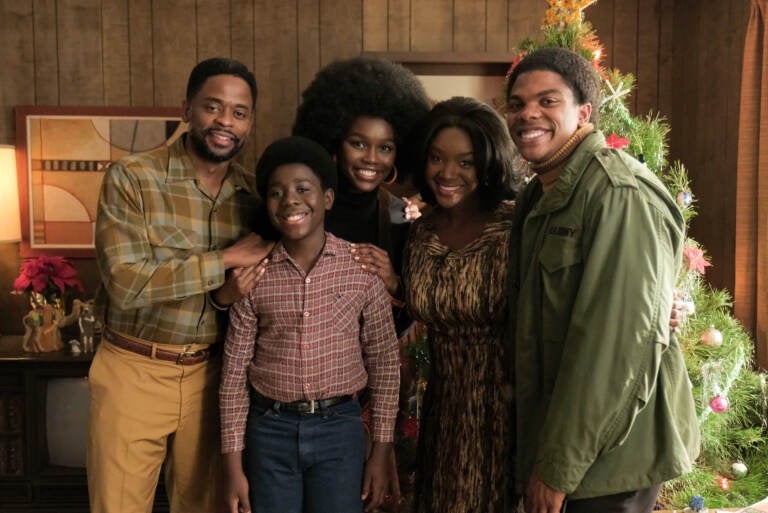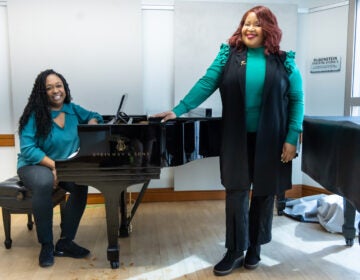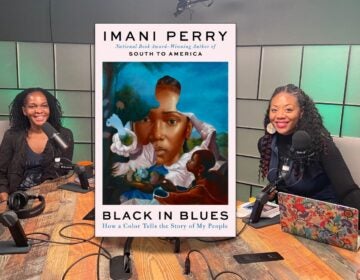Kids need to see themselves reflected in media. Here are some recommendations

THE WONDER YEARS - ÒHome for ChristmasÓ - Dean canÕt wait to spend Christmas with his older brother, Bruce, when he returns home from Vietnam. But adjusting to life back in Montgomery comes with unexpected challenges for Bruce, and the rest of the Williams family rely on their favorite holiday traditions to bring cheer on ÒThe Wonder Years,Ó WEDNESDAY, DEC. 1 (8:30-9:00 p.m. EST), on ABC. (ABC/Erika Doss)
Tired of looking for family entertainment where diversity doesn’t feel like a token after-thought? Look no further.
Two recent studies on diversity in television and children’s media in particular show that:
- Mainstream media content still features mostly White characters, despite the fact that the U.S. population is no longer majority Caucasian.
- The world of children’s media is slightly more diverse than adult content, but it too is still not representative of the U.S. population.
- An increasingly diverse population favors diversity in the media they consume.
“The media sometimes serves as a window and sometimes serves as a mirror,” says Mariana Diaz-Wioczek. She spent years as the head of education and research on Nickelodeon’s Dora the Explorer and currently consults on the new PBS Kids show Alma’s Way, one of our recommended titles below. “The shows and characters that resonate the most are actually both. You see yourself reflected in them, but you also get to learn about other things through them.”
We asked a handful of children’s media experts to recommend their favorite new content that gets high marks for both great storytelling and inclusion. Here are some of their picks for books, video games, and TV from 2021 and 2020.
LITTLE KIDS
Picture books
Nana Akua Goes to School, written by Tricia Elam Walker with illustrations by April Harrison
Zura wants to bring her West African grandmother to school for Grandparents Day but she’s afraid the traditional tribal markings on her face will frighten her classmates. “But her grandmother just aces the situation by showing how she can make differences familiar and therefore bridge … the cultural gap,” says Deborah Pope, executive director of the Ezra Jack Keats Foundation. “I think all kids will resonate with Zura’s … fears of being different, and then really be comforted by the way you resolve those fears.”
The Me I Choose to Be, written by Natasha Anastasia Tarpley with photography by Regis and Kahran Bethencourt
A young ballerina dances across a luminous, violet night sky. A child astronaut donning a silver suit is poised to explore the galaxy. Kevin Clark calls The Me I Choose to Be‘s reach-for-the-stars declarations an “uplifting, powerful book that encourages self-awareness and confidence and talks about possibilities.” Clark says the “bright, vibrant” images are “unlike anything I’ve ever seen in a children’s picture book.”
Brick by Brick, written and illustrated by Heidi Woodward Sheffield
With a smattering of Spanish throughout, Luis loves talking about his father, Papi, a construction worker. “Papi’s work is brick by brick. Mine is book by book,” Luis beams with pride. Pope says Sheffield’s colorful collages “knock it out of the park” and applauds the story for highlighting a father/son relationship, “something that we need to see more of in children’s books.”
Can Bears Ski?, written by Raymond Antrobus with illustrations by Polly Dunbar
Little Bear experiences the world through feeling, the “rumbles” when his dad yells, the “crunch” when he walks in the snow. But Little Bear has trouble understanding people when they speak. A visit to an audiologist reveals he’s experiencing deafness. “What’s special about this book,” says Pope, “is that it really reveals to the hearing readers how rich the world is in terms of sensation for non-hearing people.”
We Are Water Protectors, written by Carole Lindstrom and illustrated by Michaela Goade
A little Ojibwe girl warns of the dangers of “the black snake,” a metaphor for the Dakota Access Pipeline. Lindstrom and Goade “do such a beautiful job showing how we are connected to the land, the water in particular and all of the animals and those main elements that we depend upon,” says Princess Daazhraii Johnson.
Television
Created by former Sesame Street actor Sonia Manzano, Alma is a little Puerto Rican girl from the Bronx who makes inclusivity cool. She’s a problem solver who exudes positivity. The PBS Kids show takes on “common childhood issues about how to be a good friend or, if you want to be good at something, you need to practice,” says Amy Jordan. “The colors pop. The characters are vivid. It’s just a really well-done program.”
From a skate shop in Venice to a restaurant in Boyle Heights, a group of kids interview the ghosts that inhabit Los Angeles. In the process they learn about their city’s history. “Unique,” “groundbreaking” and “my cup of tea,” gushes Princess Daazhraii Johnson about the new Netflix series. “I just love how it relates so deeply to place,” she says. “It’s so amazing to see this sort of depth and connection … that really honors the First Peoples of that place.”
Video games
DC Super Hero Girls: Teen Power, ages 8-10
In this open world, all-female, action adventure, players get both a sense of the characters “as their superhero selves going on quests and adventures,” says Jeff Haynes, and “their alter ego lives, so you see them going to high school and interacting with some of the characters from the TV show” of the same name.
Oregon Trail Apple Arcade Edition, 8-10
If, according to the Oregon Trail game’s website, “Surviving blizzards, broken limbs, snakebites, exhaustion, starvation, and the dreaded dysentery” is your idea of fun, this is the game for you. Haynes says this updated version of the classic 1971 Oregon Trail game “really breaks a lot of new ground,” by including Native Americans as well as African-Americans and other races that also migrated west.
TWEENS
Books
Stuntboy in the Meantime, written by Jason Reynolds with illustrations by Raul The Third
Portico Reed is described as “the greatest superhero you’ve never heard of.” He lives in an apartment building he calls “the biggest house on the block,” where “behind every door is a new TV show.” Kevin Clark says, “It’s funny. It’s whimsical. … It tackles issues like divorce and anxiety and bullying in a way that is authentic and disarming so that you’re not being preached to.”
The Whale Child, written and illustrated by Keith Egawa and Chenoa Egawa
A whale child is turned into a human in order to spread the word that the oceans are in trouble. He befriends a human girl and tells her about his firsthand experience of the impact of pollution on the water, “the living veins of our planet.” Princess Daazhraii Johnson says, “They just have this understanding that they’re going to come together and learn from one another.” Johnson, a member of the Gwich’in people of Alaska, is thrilled to see a story that reminds her of her own culture. “We have so many stories of how we as humans became the animals so that we could understand each other better and know how to revere and respect one another.”
Video games
Sakuna: Of Rice and Ruin, ages 11-13
“But even a goddess needs to eat …” according to the website for this multi-layered game. The visual presentation is “gorgeous,” says Haynes. “It’s a really interesting mix of Japanese mythology, farming, role-playing. It seems like it wouldn’t necessarily wind up working, but it works very, very well.”
Miles Morales, 11-13
Not only is Miles Morales navigating life as a teenager, he’s Spider-Man trying to protect his Harlem neighborhood from an evil corporation and street gangs. Haynes says multiple layers keep this game interesting. Miles cares deeply about his diverse community, which includes people of color, people with disabilities and LGBTQ people. But the action adventure is all about “this character who is really just trying to get his powers under control,” says Haynes.
BIGGER KIDS (14+)
Books
Apple (Skin to the Core), written by Eric Gansworth
Gansworth, an enrolled member of the Onondaga Nation, explores the issue of identity in the face of colonization and reclaims the word “apple,” a racial slur meaning “red on the outside, and white on the inside.” For Johnson, this memoir-in-verse contextualizes history and “brings you into the nooks and crannies” of what generations of one family experienced through forced assimilation in government boarding schools.
Video games
Tell Me Why, ages 14-17
Ten years after the death of their mother, twins are reunited in their Alaska hometown with a lot of questions about the past. Tell Me Why is the first major studio game to feature a transgender lead character. The developers consulted with GLAAD as the story was being created. Issues addressed in this supernatural mystery include sexual identity, mental health and religion. “It goes through so many different aspects of content, while also giving the player the ability to, in some cases, define or refine the story,” says Haynes.
Television
The reboot of the 1988 series changes the race of the family at the center of the story from White to Black. Uhls praises the show for its authenticity. “It’s a Black, middle-class family that is together. They’re not pathologized.” For example, says Uhls, the mother isn’t colorized, “She feels real.” Uhls believes the new Wonder Years gives viewers what today’s audiences want: “more nuance in diversity.”
Three cousins try to save their grandfather’s taqueria – and a lot more – in this comedy-drama set in Boyle Heights, the majority Latino neighborhood in Los Angeles. They’re fighting his possible deportation, all while trying to pursue their dreams. “As a child of immigrants, that is a story that I really relate to,” says Yalda Uhls, whose parents were born in Iran. Uhls says Gentefied is “a realistic look” at gentrification, immigration, family and the “journey of acculturation.”
Need more ideas? Check out Common Sense Media and/or the ALSC Book and Media Awards Shelf, curated by the Association for Library Service to Children (ALSC), a division of the American Library Association.
9(MDAzMzI1ODY3MDEyMzkzOTE3NjIxNDg3MQ001))




